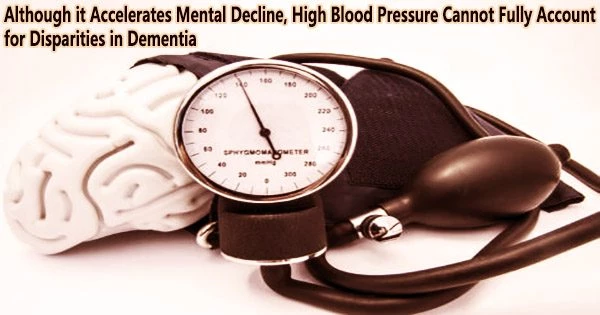According to a recent study, people with high blood pressure have a faster decline in their capacity to reason, make choices, and recall information.
The researchers used data from six sizable trials, which they aggregated and evaluated, to track the relationship between high blood pressure and deteriorating brain function over time. They demonstrate that people of Hispanic descent experience cognitive deterioration brought on by high blood pressure at the same rate as non-Hispanic white people.
The team had set out to see if differences in long-term blood pressure control explained why Hispanic people face a 50% higher overall risk of dementia by the end of their life than non-Hispanic white people in the United States.
But the new findings suggest that other factors may play a bigger role in that disparity.
“Nevertheless, the new study in the Journal of Alzheimer’s Disease serves as an important reminder of the key role that controlling blood pressure plays in long-term brain health,” says Deborah Levine, M.D., M.P.H., lead author of the study and director of the University of Michigan’s Cognitive Health Services Research Program.
“Our findings suggest that high blood pressure causes faster cognitive decline, and that taking hypertension medication slows the pace of that decline,” says Levine, a professor of internal medicine at the U-M’s academic medical center, Michigan Medicine.
“Since other studies have shown that people of Hispanic heritage in the United States tend to have higher rates of uncontrolled hypertension than non-Hispanic white people, due in part to worse access to care, it’s vital that they get extra support to control their blood pressure even if blood pressure is only part of the picture when it comes to their higher dementia risk,” she adds. “A risk factor like uncontrolled high blood pressure that is more prevalent in one group can still contribute to substantial health disparities.”
Our findings suggest that high blood pressure causes faster cognitive decline, and that taking hypertension medication slows the pace of that decline.
Professor Deborah Levine
Levine and her coworkers examined alterations in the thinking and memory skills of persons over 18 who participated in six lengthy research carried out over the previous fifty years. They had access to each person’s data for an average of almost eight years, including their systolic blood pressure, which is the highest number in any blood pressure reading.
They were able to track blood pressure measurements and changes on tests of memory, executive function, and cognitive performance in Hispanic and non-Hispanic white individuals more clearly using the larger data set than they could with a single smaller data set.
The data were collected from 2,475 Hispanic and 22,095 non-Hispanic white adults, none of whom had a history of dementia or stroke at the time of enrollment. At enrollment, the average systolic blood pressure was lower in Hispanic adults than non-Hispanic white adults (132.5 mmHg compared with 134 mmHg), despite Hispanic adults having older age than non-Hispanic adults (62 versus 54) and blood pressure tending to increase with age.
Overall, both groups saw the same rate of decline in thinking and memory caused by elevated blood pressure.
Levine and colleagues found that the Hispanic group saw a faster deterioration in general cognitive function than the non-Hispanic white group when they focused just on the two studies that had purposefully included participants of Hispanic descent.
However, differences in blood pressure between the groups did not account for variations in cognitive decline, possibly because Hispanic participants in these trials had lower blood pressure than non-Hispanic white participants.
Levine notes that the studies included data on years of education. The social determinants of health, which may contribute to differences in cognitive decline between Hispanic and non-Hispanic white persons, such as income, education level, early life experiences, family characteristics, living situations, and more, were not fully disclosed.
Members of the research team published their findings from a comparable analysis of data from Black and White participants in several of the same trials two years ago. In that study, it was discovered that variations in blood pressure control over time contributed to the explanation of why Black people experienced a greater deterioration in cognitive function.
Levine and colleagues at the U-M Frankel Cardiovascular Center are currently studying other aspects of cognitive decline disparities, including her own team’s research on post-stroke cognitive declines, and Lewis Morgenstern, M.D., M.S.’s BASIC Cognition study. \’/
The risk of dementia after a stroke can increase fifty-fold, however it is not yet understood how blood pressure and blood sugar levels might be managed to reduce the risk of dementia after a stroke.
















